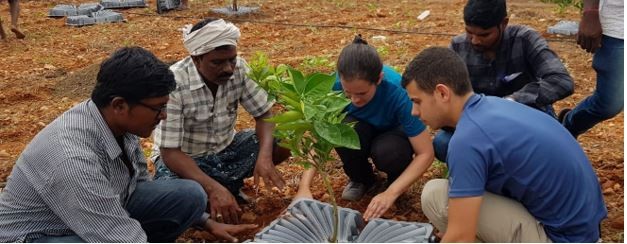Photo Credit: Nitsan Sustainable Development Lab,
Tel Aviv University, Israel
Global Challenges, Israeli Solutions: State of the Art in Israeli Sustainability Studies and Agricultural Sciences
By Randy Pinsky
“Our house is on fire.”
If you have listened to any of enviro-activist Greta Thunberg’s speeches, you’ll know that climate change is a steadily encroaching reality.
In typical Israeli fashion however, problems like these are viewed as puzzles to respond to with creativity, not paralysis, as evidenced in the “Global Challenges, Israeli Solutions” talk hosted on September 19.
Azrieli Director Csaba Nikolenyi beamed, “I am honored to introduce the best of the minds that Israel - especially Tel Aviv University - offers in sustainability and agricultural research” (indeed, the speakers recently met Israeli Prime Minister Naftali Bennett to discuss the climate change crisis).
Action, Not Just Talk
Professor Colin Price, head of Tel Aviv University's Department of Environmental Studies, specializes in climate variability, and Dr. Ram Fishman complimented the talk as director of the NITSAN Sustainable Development Lab.
For both, it is not enough to merely discuss the issues. They believe that the only way to effectively combat the impacts of climate change for the most vulnerable is through collaboration and Israeli ingenuity.
“I've been doing research for 30+ years on the science of climate change, and I can do another 30 years,” quipped Price.
“But the only thing that would change is that I will be just a lot more certain on how bad it’s going to get.”
Learning Outside the Classroom
The speakers’ respective programs are based on experiential learning. For instance, Price’s team assists environmentally-focused startup companies with their business models. Over 60 have gone through the program in the past seven years (there’s a reason Israel is known as ‘Start-Up Nation’!) and many have attained venture capital status.
In spite of the best of intentions, however, there is often a disconnect between the proposed agri-tech idea and local capacity.
Enter NITSAN (‘flower bud’): “[Our] goal is to create a bridge between Israeli innovation and the ground realities of low-income countries through intensive fieldwork.” Far from the comfort of classrooms, students live - and collaborate - with local communities to test and adapt environmental solutions.
Clandestine Collaborations
Israel is uniquely situated to assist the small farm-holders of the world attain prosperity while balancing environmental preservation. While there are endless possibilities for collaboration however, there are inevitable undertones in the political climate.
Indeed, although Israel has projects in the United Arab Emirates, Egypt, and the Palestinian territories, they must often be ‘under the table’ and in conjunction with a third party; a damper for those who perceive common initiatives as the key to peace in the region.
For instance, Israel and Jordan are involved in an integrated pest management program concerning the red date palm weevil. While the actors must tread cautiously, Fishman commented, “The pest does not know about borders and crosses very comfortably from one to the other.”
Messages of Hope
Notwithstanding these challenges, the researchers are optimistic that projects of all stages will make environmental inroads, with hopes for greater forthcoming partnerships. “There are no quick fixes with climate change,” reminded Price; “We need long-term vision and collaborations.”
Meaningful change is possible, for “Israeli agri-tech does not only grow food; it grows innovation,” concluded Fishman. “And it is those innovations that can help the world feed itself sustainably”.



